June marked the 25th Anniversary of Gramercy! Thank you to our valued investors, trusted business partners and team members without whom this milestone could not have been reached. We are excited for the opportunities we see ahead, and look forward to continuing to deliver upon our mission to have a positive impact on the well-being of our clients, portfolio investments (and their communities) and our team members.
Contents
Market Overview
Macro Review
U.S. exceptionalism kept the dollar well supported. The strong beat on U.S. ISM services provided more data to support the higher-for-longer theme in U.S. Treasuries as the swap pricing for December 2024 rose and the prospect of a November hike increased, even if next FOMC event later this month is likely to be a pause. The next wildcard is the ECB. Miserable German factory orders could challenge any previously held assumptions of additional tightening. The Bank of England’s Governor also stated that policy was “near the top of the cycle”, with the dovish remarks contributing to GBP weakness. The next theme is the longest run of losses for European stocks in more than five years after weak German economic data. The same weak trade data was visible out of China, as CNH fell to a record low and supported an even stronger USD. The one inconsistency was the rally in Chinese property stocks, which implies more stimulus on top of what was announced last Monday (Sunac +164%; Evergrande +133%; and Shimao +68%). Having said that, Japan’s top currency diplomat Kanda warned that officials will not rule out any options in response to FX moves, which was the strongest verbal warning, although it was not necessarily enough to bring down JPY. Another contributing factor to weak Asian FX over the week was re-accelerating Asian inflation. This was visible out of Japan and Korea, where the upside risks extended to Thailand and Taiwan. We also noted that brent oil prices rose to above $91/bbl for the first time since November as Saudi Arabia and Russia announced voluntary cutbacks, U.S. inventories disappointed and natural gas prices spiked on Chevron strikes in Australia. Key EM developments saw Poland’s Central Bank cut rates by 75bps, which was far more than expected as political pressure appears to be brewing into elections on October 15th. Meanwhile, Mexico’s draft budget for 2024 included an $11bn provision for Pemex debt, which kept the bond curve well supported. Finally, Gabon’s General Brice Nguema, was sworn in as interim President, just as Raymond Ndong Sima was appointed as interim Prime Minister. These events had immediately trigged the suspension of ECCAS membership and Niger cited that it would likely be a 3-year transition, just as ECOWAS pushed for a 9-month transition back to democracy. Finally, the UN published the Food and Agriculture World Food Price Index and showed how prices rose 2% m/m in August but were down 12% y/y and 24% below Russia-Ukraine war outbreak. There was a 10% increase m/m in rice prices, which have risen to a 15-year high, following India’s partial export ban. The key themes are around the renegotiations of a Black Sea grain deal, Saudi Arabia and Russia’s voluntary oil production cut, India’s rice export ban, U.S. soft landing and extreme weather events with an El Nino.
EM Credit Update
Emerging market sovereign credit (cash bonds) ended the week down 0.7% with credit spreads 7bps wider. Sovereign outperformers were Ecuador, Pakistan and Gabon, while Zambia, Ethiopia and Argentina underperformed. The broader theme over the week was around the re-opening of the primary market. While there was over $16bn in EM primary issuance this week, there was in excess of $52bn issued from U.S. IG companies, with $36bn issued last Tuesday after Labor Day. The split of the $36bn was from 20 issuers in 45 tranches, which is an impressive feat. The second important factor was China’s Country Garden curing two coupon payments on USD bonds within the grace period, as the company remains current on debt obligations. The next USD coupon payment is on September 17th with the 6.15% 2025 notes.
The Week Ahead
The major focus of next week is around the ECB. The key questions are whether all policy rates remain unchanged, with the deposit rate at 3.75% and main refinancing rate at 4.25%. Equal focus will be on whether the ECB maintains PEPP forward guidance (likely to remain unchanged) where maturing securities will be reinvested at least until the end of 2024, but APP securities are not expected to be reinvested. The remuneration of reserves and TLTROs are also expected to remain unchanged. Finally, there is a broader question over the remuneration of government deposits and whether the ECB will follow the Bundesbank in bringing it to zero. U.S. inflation will also be closely watched. Elsewhere, China will furnish its NBS and Caixin manufacturing PMIs, followed by the one-year MLF rate decision (2.5%), with India providing its 2Q GDP reading. EM interest rate decisions are limited to just Angola (17.0%), Peru (7.75%) and Russia (15.0%). Inflation updates are also due out of Argentina, Brazil, Czech Republic, Poland and Romania, with Turkey updating its current account balance.
Highlights from emerging markets discussed below: Turkey’s policymakers signal a deeper economic adjustment than previously anticipated, Poland’s Central Bank begins aggressive policy easing as pivotal elections near and Nigeria’s court rejects pleas by losing candidates against President Tinubu election win.
Fixed Income
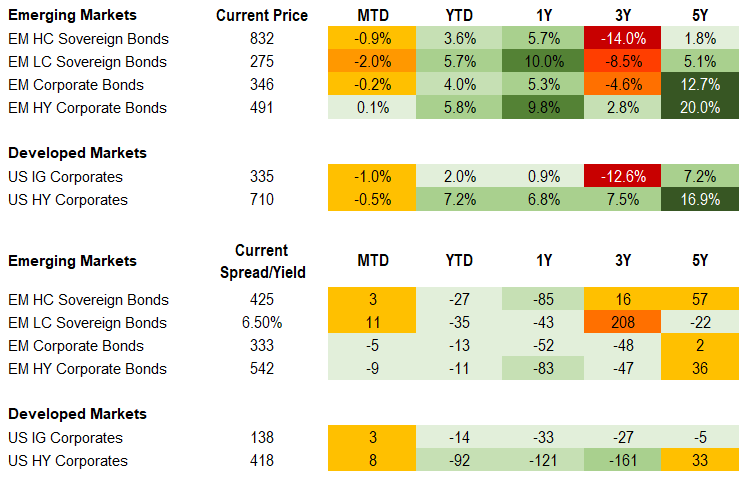
Equities
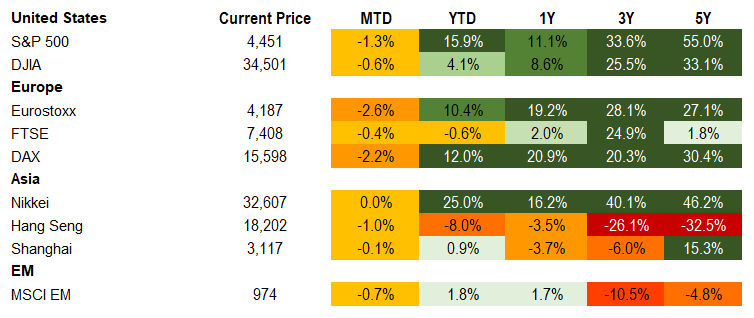
Commodities

Source for data tables: Bloomberg, JPMorgan, Gramercy. EM Fixed Income is represented by the following JPMorgan Indicies: EMBI Global, GBI-EM Global Diversified, CEMBI Broad Diversified and CEMBI Broad High Yield. DM Fixed Income is represented by the JPMorgan JULI Total Return Index and Domestic High Yield Index. Fixed Income, Equity and Commodity data is as of September 8, 2023 (mid-afternoon).
Emerging Markets Weekly Highlights
Turkey’s policymakers signal a deeper economic adjustment than previously anticipated
Event: Turkey’s government released its Medium-Term Economic Program for 2024-26, signaling a stronger-than-expected commitment to tackle inflation and continue to normalize macroeconomic policy. Meanwhile, President Erdogan publicly referenced “tight monetary policy” in a notable departure from his typical rejection of high interest rates.
Gramercy commentary: The medium-term program unveiled this week appears to target deeper and faster macroeconomic policy normalization, defying investor concerns about political constraints to a potential return to economic orthodoxy in Turkey. It comes on the heels of an upside surprise delivered by the Central Bank (CBT) when it hiked the main policy rate by 750bps to 25% on August 24th versus the maximum of 250bps expected by markets. These recent developments and President. Erdogan’s astonishing public endorsement of “tighter monetary policy” suggest to us that market-friendly FinMin Mehmed Simsek and his team have been able to persuade the President to allow a pivot to relatively orthodox management of the Turkish economy at a less gradual pace than previously anticipated. However, markets need to remain vigilant about potential backtracking as we get closer to important local elections in March 2024 in which President Erdogan will strive to recapture control of key municipalities, including Istanbul and Ankara, that he lost to the opposition in 2019.
Poland’s Central Bank begins aggressive policy easing as pivotal elections near
Event: The Polish Central Bank (NBP) surprised markets by launching its policy easing cycle with a significantly larger-than-expected 75bps rate cut to 6.0% vs a median consensus expectation of 25bps.
Gramercy commentary: NBP’s aggressive first rate cut in the cycle comes despite the authorities’ own projections that inflation is likely to stay above target until 2025, which has reinforced views among market participants and opposition politicians that pre-election political considerations might have influenced the decision ahead of Poland’s parliamentary elections on October 15th. Such claims have been vehemently rejected by NBP’s leadership, but investors expect another cut of similar magnitude at the next policy meeting on October 4th, just days before the elections. Their outcome carries significant market implications as a populist far-right and anti-EU alliance, Confederation, could become the “kingmaker” in the context of coalition-building efforts and exercise significant influence over economic and foreign policy direction.
Nigeria’s court rejects pleas by losing candidates against President Tinubu election win
Event: The Presidential Election Petition Tribunal rejected in a unanimous decision claims against the legality of Bola Tinubu’s victory in the February Presidential Elections.
Gramercy commentary: The petitioners, Opposition Candidates Peter Obi and Atiku Abubakar, demanded that Tinubu’s election win be annulled. They claim that the Independent National Electoral Commission (INEC) failed to comply with guidelines for the February vote, which has been dismissed by the court. The claimants can still appeal in front of Nigeria’s Supreme Court that will have until November 5th to deliver a final verdict, but a reversal appears unlikely. Following the affirmation of his win, President Tinubu’s ambitious market-friendly reform agenda could see a welcome boost. After a promising start when Mr. Tinubu took office back in May, it has stalled in recent weeks amid social opposition to removal of fuel subsidies and currency liberalization among other measures, as well as rising geopolitical tensions in the region following coups in neighboring Niger and Gabon.
Emerging Markets Technicals
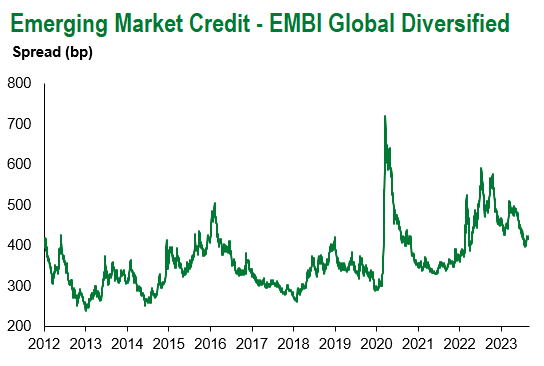
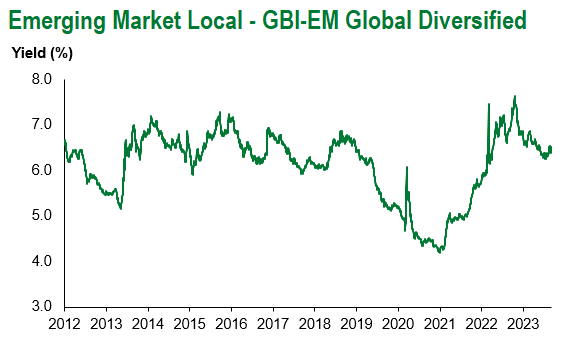
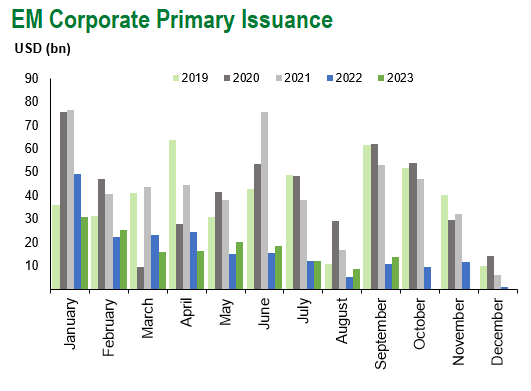
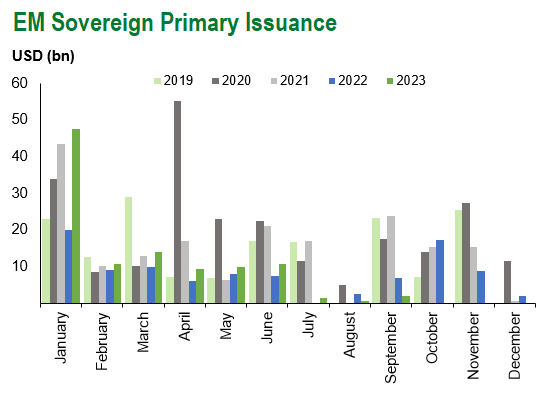
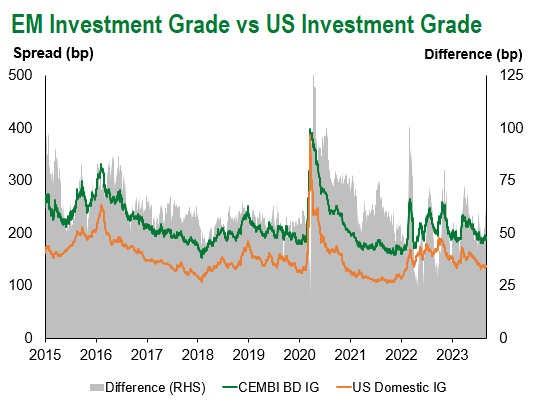
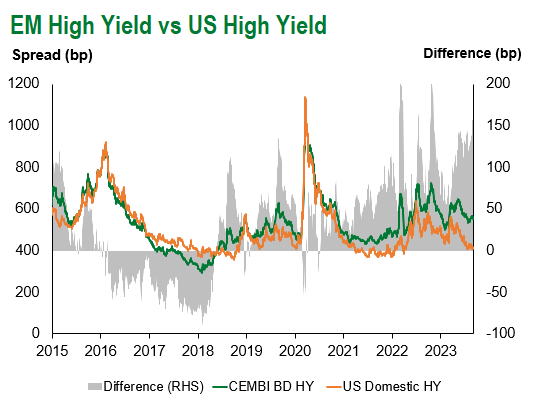
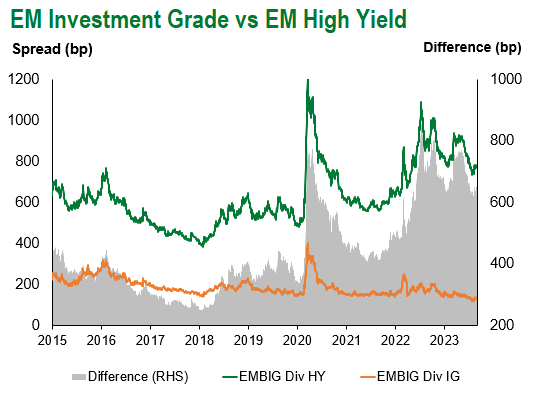
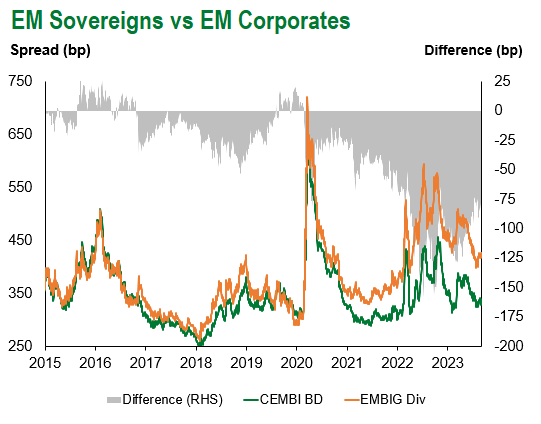
Emerging Markets Flows
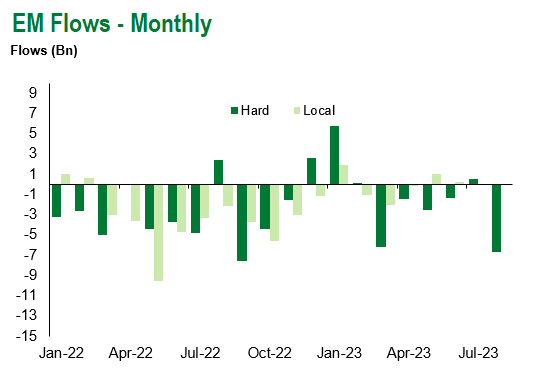
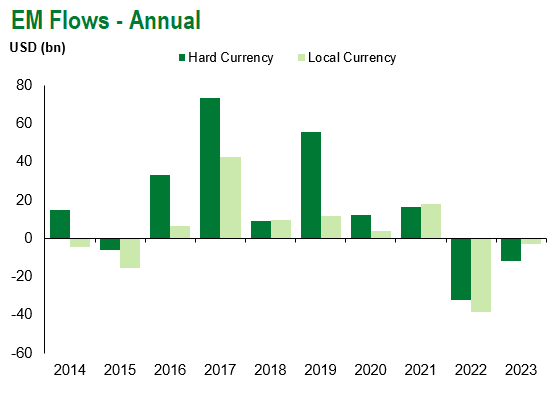
Source for graphs: Bloomberg, JPMorgan, Gramercy. As of September 8, 2023.
For questions, please contact:
Kathryn Exum, CFA ESG, Director, Co-Head of Sovereign Research, [email protected]
Petar Atanasov, Director, Co-Head of Sovereign Research, [email protected]
James Barry, Director, Deputy Portfolio Manager, [email protected]
This document is for informational purposes only. The information presented is not intended to be relied upon as a forecast, research or investment advice, and is not a recommendation, offer or solicitation to buy or sell any securities or to adopt any investment strategy. Gramercy may have current investment positions in the securities or sovereigns mentioned above. The information and opinions contained in this paper are as of the date of initial publication, derived from proprietary and nonproprietary sources deemed by Gramercy to be reliable, are not necessarily all-inclusive and are not guaranteed as to accuracy. This paper may contain “forward-looking” information that is not purely historical in nature. Such information may include, among other things, projections and forecasts. There is no guarantee that any forecasts made will come to pass. Reliance upon information in this paper is at the sole discretion of the reader. You should not rely on this presentation as the basis upon which to make an investment decision. Investment involves risk. There can be no assurance that investment objectives will be achieved. Investors must be prepared to bear the risk of a total loss of their investment. These risks are often heightened for investments in emerging/developing markets or smaller capital markets. International investing involves risks, including risks related to foreign currency, limited liquidity, less government regulation, and the possibility of substantial volatility due to adverse political, economic or other developments. References to any indices are for informational and general comparative purposes only. The performance data of various indices mentioned in this update are updated and released on a periodic basis before finalization. The performance data of various indices presented herein was current as of the date of the presentation. Please refer to data returns of the separate indices if you desire additional or updated information. Indices are unmanaged, and their performance results do not reflect the impact of fees, expenses, or taxes that may be incurred through an investment with Gramercy. Returns for indices assume dividend reinvestment. An investment cannot be made directly in an index. Accordingly, comparing results shown to those of such indices may be of limited use. The information provided herein is neither tax nor legal advice. Investors should speak to their tax professional for specific information regarding their tax situation.
